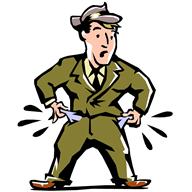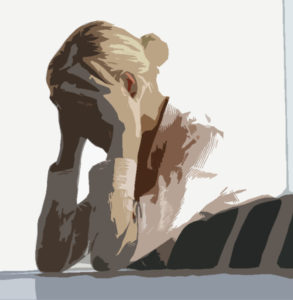Money Tips

If I file bankruptcy, where can I bank?
If you are considering bankruptcy, you are advised to move any accounts you may have with Wells Fargo or Wachovia to another institution.
It doesn’t matter that you have never bounced a check and never borrowed any money from them. It doesn’t matter if you owe them money or not! If you file bankruptcy the corporate policy is to freeze your accounts. This policy continues today as litigation has resulted in a finding that this administrative freeze policy doesn’t violate the automatic stay.
Litigation continues but even if you have a corporate account it is wise to move your money. If the corporate account is linked in any manner to your personal account or social security number it will also be frozen.
How long will my account be frozen?
Likely, at least 30 days although it could only be a few days or a week. For at least some period of time, you will not have access to your money, your ATM card will not work and any checks that are outstanding will be returned. If you end up with bounced check charges and the aggravation of getting replacement payment to cover the check that will cause an even bigger mess. Eventually the account can be unfrozen but meanwhile you won’t be able to pay the mortgage or buy food.
What if I don’t file bankruptcy, can I keep my account then?
I had a client come in who had been with Wells Fargo. She mistakenly overdrew on her account by less than $15. She then lost her job and was unable to make any deposits for a while. After a few months that small original sum grew to almost $300! With her unemployment, she was not able to pay it off so she looked for an account somewhere else. She was refused a bank account at Bank of America and the local credit union because of the earlier overdraft at Wells Fargo. You want to bank at a smaller regional bank NOT one that is too big to fail.
Don’t forget – move your money from Wells Fargo (and Wachovia) to another bank or credit union before you file bankruptcy. Anywhere where you don’t have any loans, lines of credit or credit cards is fine. There are usually local banks that have free checking accounts with no monthly minimum balances to contend with. Better yet, look into a credit union account. These are member owned and usually have the best customer service.

If you have two or more of these signs, you’re in over your head.
- You use credit cards to make ends meet. You can’t make it through the month without charging on your credit cards. You tell yourself that you’ll pay off the credit but you never quite make it. You repeatedly use the cards for food, gas, medical bills and car repairs. Because you spend your money to make the credit card payments, you don’t have the funds to buy the necessities like food.
- You have no savings and no cash cushion. You don’t even try to put money away each month because it seems impossible. When the unexpected happens, you start charging on those credit cards. (Over withholding does not count as putting money away. If you rely on the IRS to save money for you, chances are you spend it as soon as you receive it). You deserve to save some money and have a rainy-day reserve.
- You bounce checks because you have no reserve. You are so close to the wire that even a small error with your bank balance causes you to have insufficient funds. While the bank may cover the balance for you, you’ll be incurring bank charges that you can’t afford. You may even end up without a bank account.
- You live on payday loans. It starts with just one that you may have even paid off. Then the second one it takes longer and costs more. These can cost you hundreds of dollars and this type of creditor gets very aggressive if you miss a payment. In fact most are automatically withdrawn from your bank account and can cause bank problems when there isn’t sufficient funds to cover the payment and your expenses.
- Creditors are calling you with threats to take legal action. You get frequent creditor calls at home or at work so you pay that creditor some money. Then you get behind on another bill until they call you.
- You feel stressed about money and frequently worry about it. It is always on your mind and you worry about how to pay the rent and other regular bills.
- You always carry a balance on your credit cards and never pay them down to zero. Even if you sometimes pay them down, you immediately charge them up again.
If you have two or more of these signs, you’re in over your head. A knowledgeable professional can help you sort things through and come up with a plan for your financial freedom.
Contact Cate today, using the contact form on the right or
call 415-504-2006 and schedule an appointment today.

“Where can I bank?” “I like having my credit card, auto loan
and savings all at the same institution.”
Don’t keep your money where you owe money. This includes your car loan and your credit card. “Can’t I just have a credit card linked to my bank account?” No. For your piece of mind, no.
It’s like the facts are covered in clouds, all hazy and buried from view. The banks offer incentives for tying together different account types because they want easy access to your money if something goes wrong with the loan, credit card, line of credit or mortgage you may have with them. Your finances may look great today but its best to prevent potential problems in the future. If you look, there is a clause in the fine print that allows the bank to take your account funds if you fall behind with any of your payments to them.
The PROBLEM is – if you are financially on the edge and just making your monthly payments when something happens to cause you to fall behind, that helpful institution may just help themselves. In most cases they have a right to offset your debt with your cash. Even if they make a mistake and you eventually get it corrected, you will be without those funds for at least 30 days.
What kind of problems could happen?
|
|
The only certain way to protect yourself from this happening is to keep your cash (checking and savings) accounts in a different institution from the bank that has your auto loan, credit card, credit equity line, and any other obligations you’ve incurred. Banks don’t care about you. They aren’t people, they are institutions. For additional bank tips see this article.
[See also the article warning of Wells Fargo and Wachovia’s account freezing practices.]
Thank you for visiting. Here you will find many informative articles about Bankruptcy Law, Tax Law, Financial Planning, and other popular legal topics.
Guide to Eliminating Debt
Through Bankruptcy for
California Consumers.